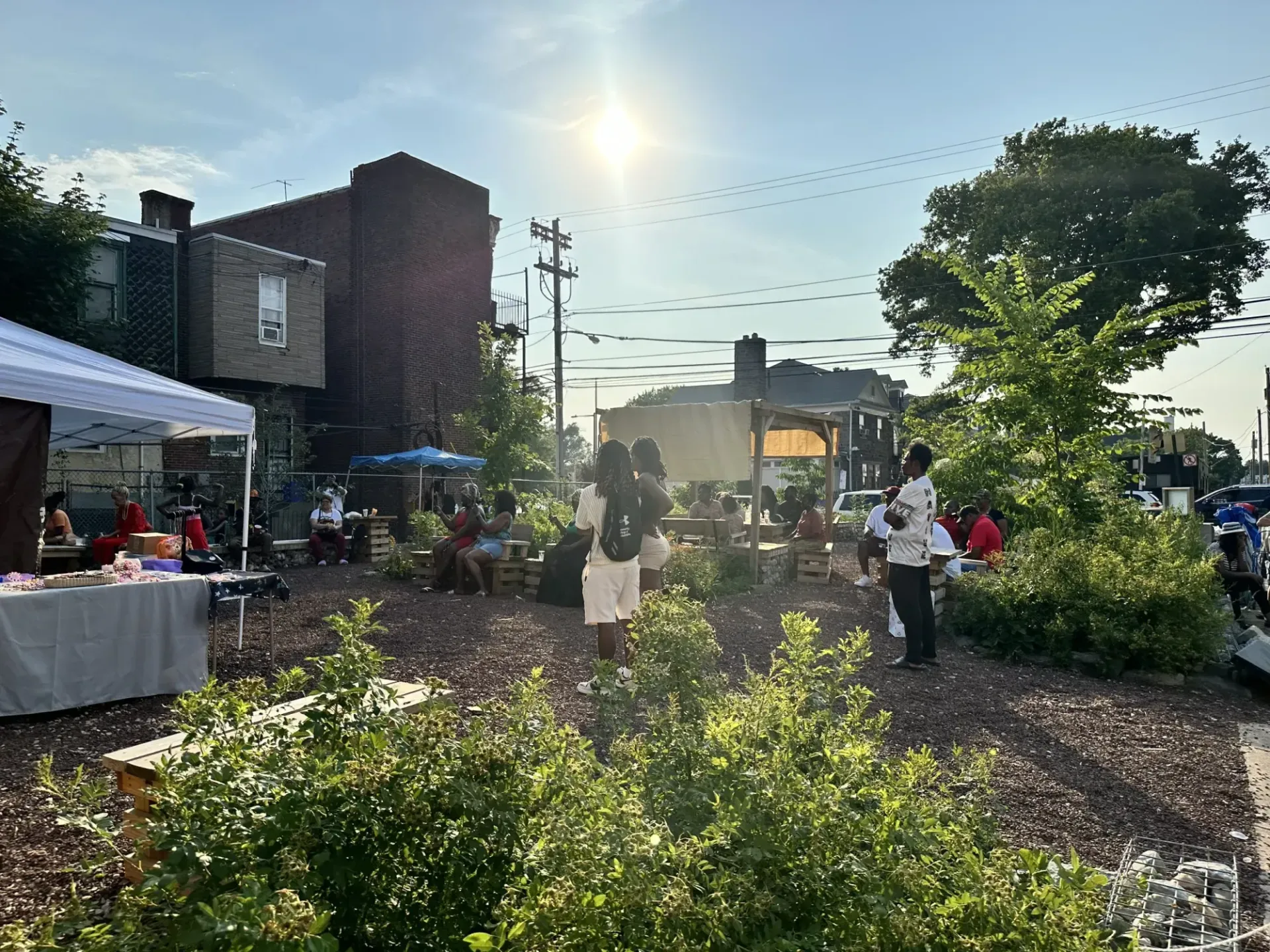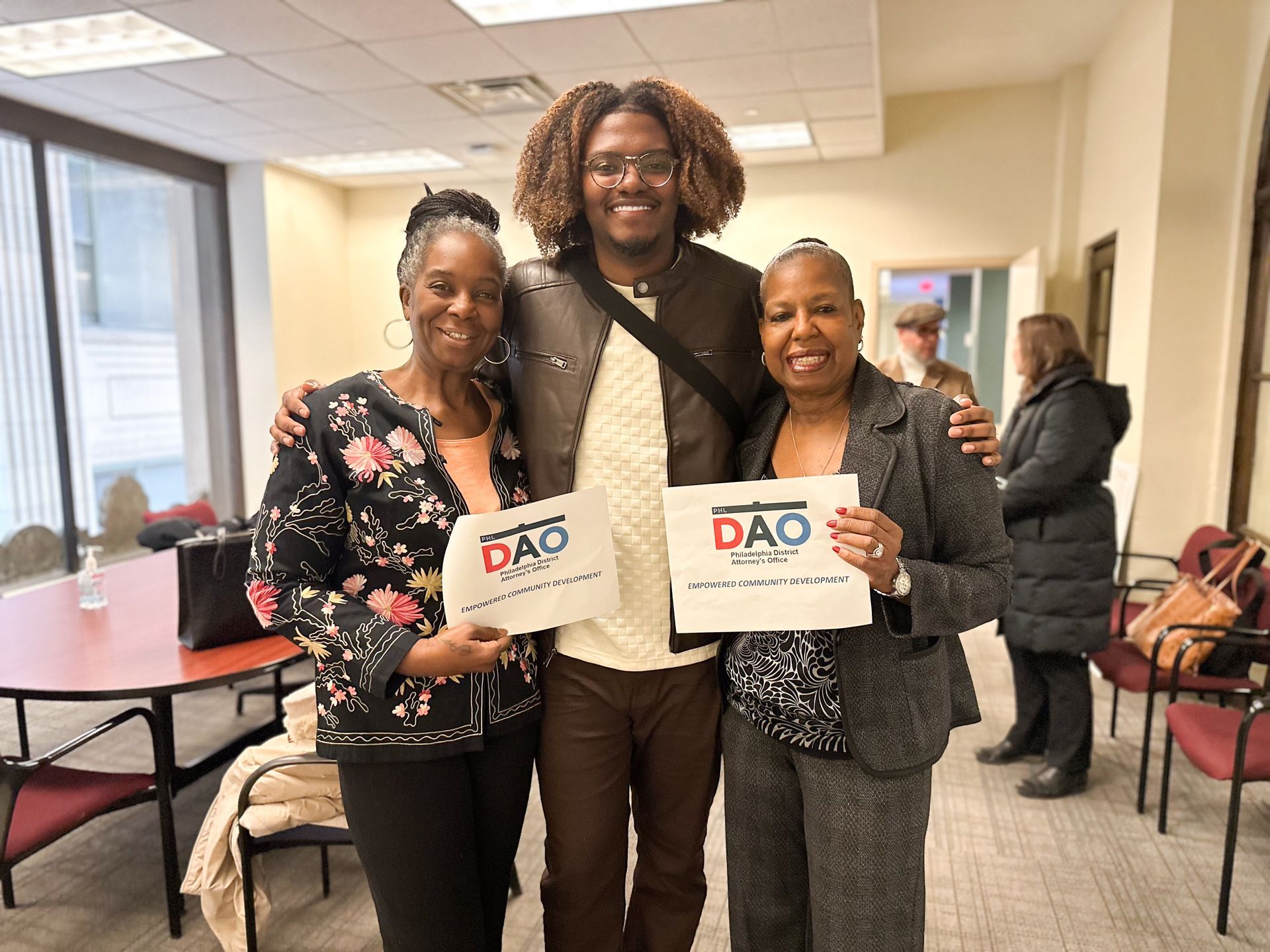Foundation puts up $5 million to spark innovation around legal dumping
Grants focus on creating avenues for residents and small haulers to dump waste.
Avarisse Crawford has been helping oversee a five-man cleaning crew in Hunting Park-East Tioga for a few years now, but she’s still occasionally amazed by the sheer volume and variety of junk that regularly turns up on the neighborhood’s streets and vacant lots.
“The guys come in, they’re talking about all of these large things that they’re unable to collect, and that really ranges,” she said, a note of incredulity creeping into her voice. “On Old York Road, a few months ago, someone left a boat. A whole boat.”
What exactly does one do with a boat, left to rot on a random stretch of road?
“We call 311 all the time with the illegal dumping that we see. Does something happen? Naw,” said Crawford, who is chief of staff at North10, a neighborhood revitalization group. “What ended up happening is that people stripped it for what they could to sell, and then our neighbors at the corner actually decided to take it in and get rid of it properly.”
Most of the larger items that North10’s cleanup crew comes across are much less interesting, she said — trash bags full of smashed up drywall, living room furniture, old cabinetry, toilets, sinks, pipes and the like.
Crawford acknowledged that the city has been trying to crack down on the widespread dumping of construction waste, tires and other debris as part of the Mayor Cherelle Parker’s 18-month-old Clean and Green initiative.
But she said the program doesn’t seem to have changed much in North10’s area so far, so the group is trying to innovate on its own.
With help from a three-year, $629,000 grant from the William Penn Foundation, North10 plans to expand the work of its cleaning crew, install surveillance cameras at a few dumping hotspots, and try out something that trash activists have long argued for — direct assistance for small waste haulers, so they can afford the high minimum fees charged by the city’s big waste recovery centers.
“We have started talking with a legal dumping facility to figure out, how could we actually transform behavior and get people to start dumping legally?” she said. “The grant is funding the subsidies instead of it coming out of people’s pockets. Because oftentimes they don’t have enough to meet that minimum.”
Keeping junk from hitting the streets
The William Penn Foundation launched its grant program on illegal dumping last year, in part because staff noticed increasing coverage of dumping in local media, said Nathan Boon, a senior program officer at the foundation. They also observed the growth of advocacy groups like the Trash Academy, an environmental justice collective, and Circular Philadelphia, which promotes recycling and reuse of materials.
The need was also confirmed by a 2023 Pew/Lenfest poll that found that 60% of residents surveyed thought the city should prioritize reduction of illegal dumping. As the foundation researched the problem, it became clear that it was important to try to address the underlying reasons people dump on the streets, Boon said.
“There are a couple interesting dynamics that emerged from our learning, going out into the field with site visits and from talking to community members,” he said. “Even if you succeed in cleaning up your block and putting up the signs and the cameras and the lights so the dumpers don’t come back to your block, there’s nothing to stop them from moving, literally, two or three blocks over.”
“It’s necessary but insufficient to pick the trash, the dumping, up off the street. The real focus is preventing it from hitting the street in the first place,” he said.
In February, the foundation awarded nine grants worth a combined $5 million. They’re funding projects ranging from new neighborhood garbage containers in the West Girard corridor to a city-run public education campaign to identify root causes and solutions to illegal dumping in South and West Philadelphia.
The recipients include two environmental organizations. PennFuture will do research and lobby the city to sharply boost enforcement and enlarge the Police Department’s environmental crimes unit. The Clean Water Fund will partner with Trash Academy to increase public awareness.
Empowered CDC plans to use its grant to establish two legal dump sites for residents in Southwest Philadelphia. Fairmount CDC will install outdoor garbage enclosures, boost enforcement, do neighborhood engagement and plant trees, while the West Philadelphia Corridor Collaborative will contract with Trashmitter, an “Uber for trash,” to collect waste quickly from 125 businesses.
Currently, commercial trash bags can pile up on curbs for days while awaiting pickup, turning into hotspots that attract more trash, Boon said.
“Folks are like, ‘All right, I’m trying to, kind of halfway, do it appropriately. I’m making some effort.’ But we’ve just got to lower the barriers a little bit for folks and meet them where they are,” Boon said.
Two grants totaling $1.8 million will go to the city. Parks & Rec will hire four staffers to focus on anti-dumping efforts in Tacony Creek Park, Cobbs Creek Park, Mifflin Square and Parkside, and the Clean & Green office will hold workshops and cleanup events in coordination with SEAMAAC and the Overbrook Environmental Education Center.
A novel approach to an old problem
Crawford said North10 is working on different approaches to enable the small haulers responsible for much of the neighborhood’s street dumping to instead take their materials to Burns & Co., a large recycling and waste recovery business in North Philly.
One part is a straight subsidy to help with dumping fees, which vary by the weight of a hauler’s load but have a $200 minimum at Burns. If there were no minimum, many small haulers would be willing to pay $50 or whatever their load weighs out at, and North10 is considering simply paying the $150 difference to keep the trash off the streets, Crawford said.
“Our idea is to have signage with a QR code that allows them to receive a voucher to go dump legally. We’re going to be doing that with signage at the hotspots, and then also flyering,” she said. “Our crew is out there every day cleaning the streets, and they’re great ambassadors. They see the people with the big trucks, they see the people who could potentially illegally dump or who just know people in that industry.”
North10 has also talked to Burns staff about having the company set up occasional no-minimum days, when it will charge less to accept small loads, Crawford said.
“When we met with them the first time, that is something that they were trying to figure out if they could possibly do,” she said. “I think us coming to the table put some pressure on them to really figure it out. This summer we’ll be having a follow-up meeting to really put everything concretely on paper.”
Boon described the project as a “novel approach” that needs to be tested, while noting that Burns itself sees a lot of illegal dumping outside its property and has an incentive to find a solution.
A subsidy “can maybe lower the barrier for these small-time haulers to doing the right thing — make it worth their while to stand in line to wait and appropriately dispose,” he said.
Helping residents overcome barriers
As in Hunting Park-East Tioga, illegal dumping is also a huge problem across the broad swath of the city where Empowered Community Development Corporation operates, including Point Breeze, Southwest Philadelphia and southern West Philly.
Hot spots include areas around John Bartram High School, wooded areas in Eastwick, the abandoned Pepper Middle School site, and even the road near the city’s sanitation convenience center — a legal dumpsite for residential trash and recycling — on 63rd Street near Passyunk Avenue.
“They close at 6 o’clock, before people actually get off work. People eventually do have an overflow of trash at times, and so people end up just dumping it right there,” said Isaiah Martin, Empowered CDC’s president. “So we get tires, we get construction, we get debris, we get residential. We get it all.”
The William Penn Foundation awarded the nonprofit nearly $300,000 over three years to reduce illegal dumping — not so much from small commercial haulers, but from residents who faces barriers to proper disposal of their household trash, he said.
“They either, one, don’t know where to go, or two, cannot physically access the places to go,” Martin said. “Most of the time it’s about affordability, especially with dumping rates the way they are.”
An assist from Ya Fav Trashman
The project aims to create two legal, 24-hour dumpsites for residents. One will be at the 56th Street Gateway, a lot at the intersection of 56th, Lindbergh Boulevard and Elmwood Avenue that Empowered CDC, Bartram’s Garden, the Philadelphia Housing Authority and other partners have been working to beautify.
Last September they installed a series of colorful eco-murals by artist Kala Hagopian on the lot, turning it into an open-air art gallery. Empowered is now preparing to install a dumpster, with an enclosure decorated with murals by Fortress Arts Academy students, along with signage and surveillance cameras meant to warn off commercial dumpers, he said.
“We want to make sure that we’re not bringing the community down, but rather, we’re uplifting it,” he said. “So that it’s not just like, ‘Hey, a dumpster in the middle of the street,’ but rather, ‘Hey, this is for the immediate community to put their excess residential waste.’”
Trash to Treasure, a nonprofit founded by clean streets advocate Ya Fav Trashman, aka Terrill Haigler, will regularly empty the dumpster and take the trash to a waste recovery center, Martin said. Empowered’s team of neighborhood ambassadors will let nearby residents know about the dumpster, prevent the lot from getting blighted, and monitor illegal dumping in Southwest Philadelphia generally.

The organization hopes to install a second enclosed dumpster at Cecil Street Garden, a 2-year-old community garden at 56th Street and Kingsessing Avenue, and eventually at more sites around the neighborhood — particularly if it can find additional funds, Martin said.
The William Penn Foundation grant “sounds like a really big number, until you get into the nitty gritty of everything,” he said. “Then you realize, art is not cheap, wood isn’t cheap, dumpsters aren’t cheap, pickup isn’t cheap, security isn’t cheap, staff isn’t cheap, trash cans aren’t cheap, drivers aren’t cheap.”
“We’re definitely making it stretch to the best of our abilities, and definitely looking at other avenues of resources for this project,” he said.
(Editor’s note: A previous version of the story said the Trash Academy was working to set up a legal dump available only to small waste haulers. This is incorrect.)
Article courtsey of Meir Rinde & Billy Penn at WHYY
